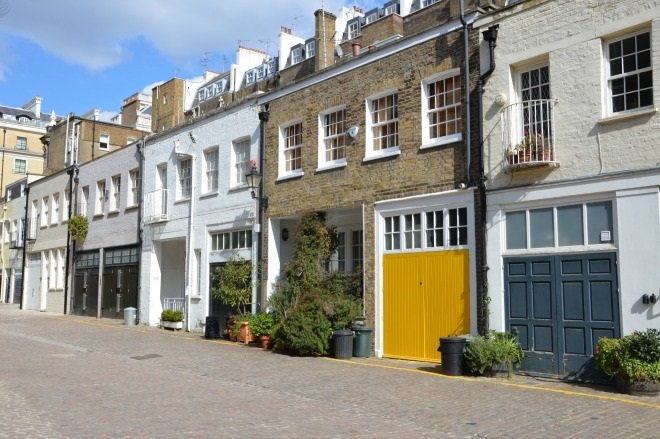
noun
- the tiny, high-pitched sound a cat or kitten makes.
- the characteristic sound a gull makes.
verb (used without object)
- to make a mew or emit a similar sound.
noun
- a small gull, Larus canus, of Eurasia and northwestern North America.
noun
- a cage for hawks, especially while molting.
- a pen in which poultry is fattened.
- a place of retirement or concealment.
- mews, (usually used with a singular verb) Chiefly British.
- (formerly) an area of stables built around a small street.
- a street having small apartments converted from such stables.
verb (used with object)
- Archaic. to shut up in or as in a mew; confine; conceal (often followed by up).
verb (used with or without object)
- to shed (feathers); to molt.
noun (functioning as singular or plural) mainly British
- a yard or street lined by buildings originally used as stables but now often converted into dwellings
- the buildings around a mews
- informal an individual residence in a mews
verb
- (intr) (esp of a cat) to make a characteristic high-pitched cry
noun
- such a sound
noun
- any seagull, esp the common gull, Larus canusAlso called: mew gull, sea mew
noun
- a room or cage for hawks, esp while moulting
verb
- (tr often foll by up) to confine (hawks or falcons) in a shelter, cage, etc, usually by tethering them to a perch
- to confine, conceal
verb
- (intr) (of hawks or falcons) to moult
- (tr) obsolete to shed (one’s covering, clothes, etc)
n.“stables grouped around an open yard,” 1630s, from Mewes, name of the royal stables at Charing Cross, built 1534 on the site of the former royal mews (attested from late 14c.), where the king’s hawks were kept (see mew (n.2)). Extended by 1805 to “street of former stables converted to human habitations.” v.“make a sound like a cat,” early 14c., mewen, of imitative origin (cf. German miauen, French miauler, Italian miagolare, Spanish maullar, and see meow). Related: Mewed; mewing. As a noun from 1590s. n.1“seagull,” Old English mæw, from Proto-Germanic *maigwis (cf. Old Saxon mew, Frisian meau, Middle Dutch and Middle Low German mewe, Dutch meeuw “gull”), imitative of its cry. Old French moue (Modern French mouette) and Lithuanian mevas are Germanic loan-words. n.2“cage,” c.1300, from Old French mue “cage for hawks, especially when molting,” from muer “to molt,” from Latin mutare “to change” (see mutable).
 Liberal Dictionary English Dictionary
Liberal Dictionary English Dictionary